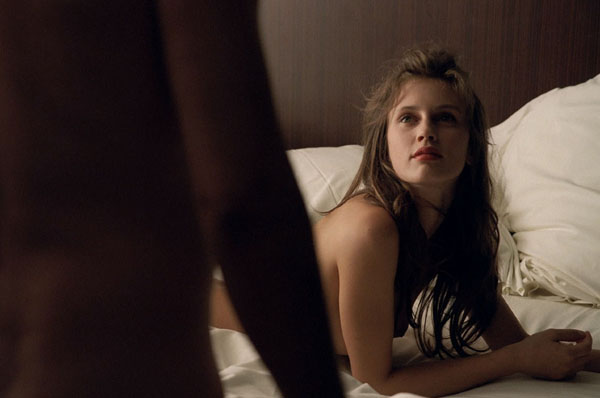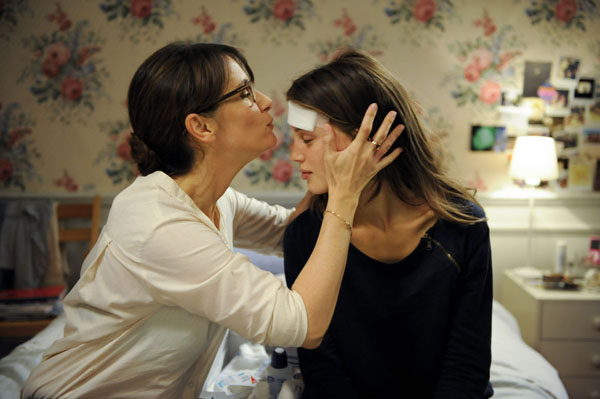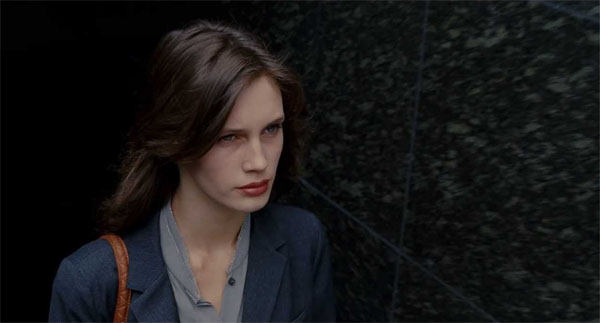“François Ozon takes another dip in the Swimming Pool with hermetic teen sex odyssey Young & Beautiful which plays like a modern day remake of Emmanuelle or Belle de Jour, but with a rather prim social conscience constantly hovering over proceedings.” David Jenkins at Little White Lies: “It stars the lissom Marine Vacth as the implacable ingenue with supermodel looks and a demure, ice-queen manner who, after loosing (actually, it’s more ‘giving away’) her cherry on a family beach holiday, casually drifts into prostitution when back in Paris. The film then does little more than riff on that scenario, covering stock bases such as parental horror, puberty woes, dirty secrets and the hard business of being self-made call girl.”
For the Telegraph‘s Robbie Collin, Young & Beautiful “is, in the very best sense, a film that won’t add up. Moment by moment you think you have the measure of it, but when you stand back, the overall picture is as baffling as that optical illusion in which the tuning fork suddenly seems to grow an extra prong…. [W]e know exactly what Isabelle has done, but nobody can quite fathom why. Is it a power trip? Emotional compensation for an absent father? Nymphomania? Debts can hardly be the reason: the cash simply piles up in clumps in her bedroom cupboard.
Ozon’s screenplay works precisely because it withholds that answer.”
“Such openness is welcome,” agrees Time Out‘s Dave Calhoun, “and it puts great emphasis on Vacth’s performance—and on the film as a character study—as we strain to read her behavior, her few words, even the look in her eyes. It’s goes without saying that Vacth’s embrace of the frank and frequent sex scenes is bold and brave. But she offers more than this. There’s a steeliness in her eyes, tempered by vulnerability, that’s deeply saddening.”
In the Hollywood Reporter, David Rooney argues that “the drama fits snugly into the body of work of writer-director Ozon, whose darkly humorous early films like Sitcom, Criminal Lovers and Water Drops on Burning Rocks all featured teenagers encountering sexual adventure with little moral encumbrance…. The new, strikingly mature film marks a natural progression from Ozon’s arresting 2012 work, In the House, in which a male teen was the agent provocateur. However, unlike that playful Hitchcockian quasi-thriller, Young & Beautiful is both more carnal and more sober, suggesting the danger and fragility inherent in the central character’s experimentation while keeping the dramatic intensity subdued.”
“Ozon delivers an updated version of La Boum (Claude Pinoteau, 1980) with an account structured in four seasons,” suggests Domenico La Porta at Cineuropa (where you’ll also find an interview with Ozon). What’s more, “each segment is punctuated by a song by Françoise Hardy, generally overly significant in its words (‘I am no longer the one I was, you made me something completely different…’), nearly there just for the style and rekindled hype which accompanied the icon of the sixties in trendy and artsy French milieus. Ozon goes as far as to use On est pas sérieux quand on a 17 ans by Arthur Rimbaud in a documentary montage which is somewhat justified by a scholarly analysis of the poem, interpreted in a personal manner by each teenager. It might be too didactic for the hardcore author cinema audience, but it remains coherent with François Ozon’s filmography.”
“As Isabelle’s baffled mother, Sylvie, the ever-sturdy Geraldine Pailhas (astutely cast to resemble Vacth physically) is first among equals in the pic’s strong supporting ensemble,” writes Leslie Felperin in Variety: “mothers everywhere will wince in sympathy at her violent, wounded reaction when she learns her daughter’s secret…. But it’s Vacth who really owns the film, some feat considering her character is so elusive, slippery as smoke, and yet more than just a cipher for screwed-up kids today.”
Screen‘s Allan Hunter finds that Young & Beautiful is Ozon’s “most fully realized portrait of an individual’s struggle to become their own ‘person’ in the face of emotional and physical changes and the reactions they provoke in the people around them.”
Elsa Keslassy profiles Vacth for Variety.
Updates: Indiewire‘s Eric Kohn: “Though undeniably intelligent, Young and Beautiful would lack a compelling center were it not for Vacth’s fascinatingly ambiguous turn, which shifts between aggressively seductive displays, reckless excitement and solemn regret. She has the look of a young Jessica Chastain in the breakthrough role she never received.”
“Holding the cards back from the audience can be a rewarding experience,” writes the Playlist‘s Kevin Jagernauth, “but here it leaves much of the filmmaker’s own purpose not just open to interpretation, but to question. At its base level, it’s an argument that Ozon positions thusly: ‘Adolescence is often idealized in cinema. For me it was a painful period of complicated transition and I’m not nostalgic about it.’ It’s a powerful and personal point-of-view, but in asking the audience to do half the legwork for him, Young & Beautiful misses an opportunity to say something definitively different about being seventeen.”
“It’s the kind of film that’s not afraid to acknowledge that people are fundamentally mysterious, and much of its power comes from the matter-of-fact way that it reconciles various perceptions of Vacth,” writes Mike D’Angelo at the AV Club. Her “interactions with a normal, nice-guy boyfriend and her well-meaning stepfather hint at a deep pathology that’s nonetheless achingly human. I’m not sure yet what to make of an enigmatic final scene featuring a cameo appearance by Charlotte Rampling, but I look forward to ruminating about it for some time to come.”
“As with many films by the prolific Ozon,” writes Keith Uhlich for Time Out New York, “there’s an ephemeral quality to Young & Beautiful that makes it seem as if it’s evaporating as you watch it. Many scenes play out with little resonance, fully formed on the surface—the ‘Summer’ section has the lazy-days glow and melancholy of Eric Rohmer’s great Pauline at the Beach (1983)—but half-baked in toto.”
The Guardian‘s Peter Bradshaw will grant that Young & Beautiful “is well-crafted and well-acted, with strong performances from Géraldine Pailhas and Frédéric Pierrot” as Isabelle’s parents. “There is also a nice contribution from Fantin Ravat as Isabelle’s kid brother Victor: a saucer-eyed onlooker and confidant—and also, I suspect, the fictional transformation of Ozon himself.” Still: “Comedy is famously anathema to eroticism, but less solemnity and a lighter touch might have served Ozon better.”
“Jeune et Jolie suffers from a sterile first half that feels just like any other erotic French drama,” finds Blake Williams at Ioncinema. “At times resembling a watered down Catherine Breillat film or a less idiosyncratic remake of Julia Leigh’s Sleeping Beauty, only a 2nd act tonal shift toward lighter Ozon territory livens things up, before fluttering to a landing (or two… or three…) that reveals Ozon’s struggle to arrive anywhere meaningful with this ultimately superficial affair.”
“The film’s visual style is also a bit disappointing,” finds Brian Clark at Twitch. “Not that Ozon has been some master stylist lately, but the mannered, nouveaux French look of the film feels extremely flat compared to the material. Yes, every shot looks nice, and it’s all well-lit, but it’s the same as nearly every other polite, mediocre French drama of the past 10 years.”
Updates, 5/17: “In outline, Young & Beautiful appears sensational: I Was a Teenage Call Girl.” Mary Corliss for Time: “Yet François Ozon’s film is tender, judicious, fascinated, sexually charged but not prurient. It pins no blame on society, school, the girl’s clients or her parents. Isabelle treats her concerned mother (Geraldine Pailhas) and amiable stepfather (Frédéric Pierrot) the way any teen might: as the security guards of an enemy state who deserve little communication and no straight answers. In fact, they are the innocents, she the daredevil spy with a dirty secret…. ‘This young woman is a mystery to me, too,’ Ozon says. ‘I’m not ahead of her, I’m simply following her, like an entomologist gradually falling in love with the creature he’s studying.’ But a key can be found in Ozon’s last film, In the House, in which a 16-year-old schoolboy devised an elaborate, largely fictional world both to amuse himself and to test his teacher. Isabelle, we may infer, wants to create a life more eventful, dramatic and potentially perilous than those of her classmates.”
EW‘s Owen Gleiberman suggests that Ozon has made a “movie that the Louis Malle of Lacombe, Lucien, or the Truffaut of The 400 Blows, would have appreciated, an explicit look at how our humanity gets lost.”
Updates, 5/18: Writing for the Daily Beast, Richard Porton notes that “although the film has already been compared to Luis Buñuel’s Belle de Jour, Young & Beautiful bears little resemblance to the surrealist master’s exploration of a repressed housewife’s desire to use prostitution as a catalyst to break free of middle-class repression. Neither does this elliptical movie share much in common with Steven Soderbergh’s more recent The Girlfriend Experience, a one-dimensional tract that made some facile analogies between prostitution and the financial follies of the Great Recession. Instead, in its own gnomic way, Ozon is redefining the discovery of the sexual revolution of the 1960s—the awareness that bodily pleasures can be divorced from love and procreation. If his response to the consequences of this legacy is notably ambiguous, it’s only because he no doubt feels that it would be too glib to either enshrine, or denounce, Isabelle’s vertiginous path to sexual freedom.”
More from Tim Grierson at Paste.
Updates, 5/19: “Ozon makes a slight attempt to flip this into a cautionary tale with a stern lecture by a police matron on the dangers of prostitution,” notes Barbara Scharres. “As far as what we see on screen, underage prostitution looks pretty safe, clean, and lucrative: You wear a designer suit and strut into nice hotels where no one questions your presence or age; the clients are mostly well-heeled and polite, and it’s fast, easy work that can fit in between the last bell and school and the family dinner. I fully expected that Young & Beautiful might get the festival’s first rousing round of booing, but no such luck.”
Also at RogerEbert.com, Michał Oleszczyk, noting that Ozon “has always been heavily influenced by Rainer Werner Fassbinder, and the new film provides further evidence of that. Cool on the surface and seemingly conventional in its narrative, Young & Beautiful is in fact deeply subversive, questioning everyday notions about sex and the institution of marriage.”
Update, 5/20: Chuck Tryon for Filmmaker: “Like other Ozon films, the narrative becomes a source for play, in a self-conscious approach analogous to Hitchcock, rather than for delving deeply into character. Mystery and intrigue become the backdrop for thinking about narration itself. In this sense, Jeune et jolie also plays with one of Ozon’s other obsessions: the processes of seeing, observing, watching, and voyeurizing…. Eventually, Jeune et jolie seemed to wear a little thin. The decision to refrain from blaming Isabelle for her actions is warranted. But, while the film’s self-consciousness is designed to license a level of voyeurism, it never quite takes the exploration of these issues to a new way of thinking about how cinema plays a role in producing or shaping visual and other pleasures.”
Update, 5/23: Sundance Selects has picked up US rights.
Update, 5/24: “Dear Penthouse Forum…” So begins Jordan Hoffman‘s review at Film.com (7.5/10).
Cannes 2013 Index. And you can watch over 100 films that have seen their premieres in Cannes right here on Fandor. For news and tips throughout the day every day, follow @KeyframeDaily on Twitter and/or the RSS feed. Get Keyframe Daily in your inbox by signing in at fandor.com/daily.






